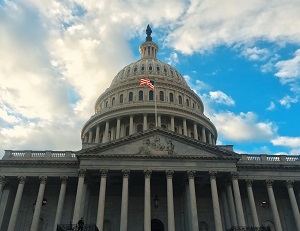Newsroom
NAFCU details what possible election outcomes mean for CUs
 Leaders of NAFCU's award-winning government affairs team Thursday provided credit unions with insights into how the power structure of Congress and regulatory agencies could be impacted by the outcomes of the 2020 election. In addition, NAFCU's Carrie Hunt published a new op-ed in CUInsight touting credit unions' position for success heading into a new year and congressional session.
Leaders of NAFCU's award-winning government affairs team Thursday provided credit unions with insights into how the power structure of Congress and regulatory agencies could be impacted by the outcomes of the 2020 election. In addition, NAFCU's Carrie Hunt published a new op-ed in CUInsight touting credit unions' position for success heading into a new year and congressional session.
As of Friday morning, presidential results for Alaska, Nevada, Arizona, Georgia, North Carolina, and Pennsylvania were unknown.
In her op-ed, Hunt, NAFCU's executive vice president of government affairs and general counsel, noted the uncertainty remaining in the election results: The presidential winner has yet to be called, and while Democrats will maintain control of the House, Senate control is dependent upon the outcome of races that are too close to call.
"It is important to remember that there are several issues still to be resolved this year before we even get to the winners being sworn in come January," Hunt wrote. "Congressional leaders will soon turn their attention to the remaining work left for this Congress, and NAFCU will be advocating for credit unions every step of the way.
"The fact is credit unions are popular, but we need your support to help bring our positive message directly to Washington policymakers in the new Congress. Each election cycle, we actively work to build new relationships with new members of Congress and build upon our relationships with returning representatives."
Read Hunt's op-ed here, and access NAFCU's resource page and Grassroots Advocacy Center to help the association build relationships and advocate on behalf of the industry.
During Thursday's Post-Election Insights & Analysis webinar, Hunt was joined by NAFCU Vice President of Legislative Affairs Brad Thaler, Director of Political Affairs Chad Adams, and Director of Regulatory Affairs Ann Kossachev to outline what issues Congress and regulators might take up under a Trump or Biden administration.
Although the margins in Congress tightened, Hunt highlighted that it was a good night for credit union champions. Adams touted NAFCU saw a 96 percent success rate for the candidates its political action committee supported.
If Congress remains divided – with a Republican-controlled Senate and Democrat-controlled House – Thaler said lawmakers may look to pass legislation that has bipartisan support, such as infrastructure, marijuana banking, and smaller tax code fixes.
At the regulators, Kossachev outlined how the CFPB's approach could change if Biden is elected and appoints a new director. She flagged issues such as overdraft, qualified mortgage definition, and payday lending as possible rules that could be affected by a leadership change. The NCUA depends on whether the Senate confirms board nominee Kyle Hauptman during the lame duck.
Register to gain access to the webinar on-demand.
No matter the changes elections bring, NAFCU is committed to serving the credit union industry's best interests and working closely with regulators and lawmakers – on both sides of the aisle – to ensure a regulatory environment that allows credit unions to thrive.
Share This
Related Resources
Add to Calendar 2024-06-26 14:00:00 2024-06-26 14:00:00 Gallagher Executive Compensation and Benefits Survey About the Webinar The webinar will share trends in executive pay increases, annual bonuses, and nonqualified benefit plans. Learn how to use the data charts as well as make this data actionable in order to improve your retention strategy. You’ll hear directly from the survey project manager on how to maximize the data points to gain a competitive edge in the market. Key findings on: Total compensation by asset size Nonqualified benefit plans Bonus targets and metrics Prerequisites Demographics Board expenses Watch On-Demand Web NAFCU digital@nafcu.org America/New_York public
Gallagher Executive Compensation and Benefits Survey
preferred partner
Gallagher
Webinar
AI in Action: Redefining Disaster Preparedness and Financial Security
Strategy
preferred partner
Allied Solutions
Blog Post
Add to Calendar 2024-06-21 09:00:00 2024-06-21 09:00:00 2024 Mid-Year Fraud Review Listen On: Key Takeaways: [01:16] Check fraud continues to be rampant across the country. Card fraud is affecting everyone. [04:31] Counterfeit US passport cards are just another new toolbox in the bad actors’ toolbox. [07:21] Blocking the fallback is the only way to defeat counterfeit cards. [11:17] The best way is constant education to your members in as many channels as you can. [13:02] We are still seeing overdraft lawsuits. Make sure the programming you have at your credit union matches what you have displayed for the members. Web NAFCU digital@nafcu.org America/New_York public
2024 Mid-Year Fraud Review
Strategy & Growth, Consumer Lending
preferred partner
Allied Solutions
Podcast
Get daily updates.
Subscribe to NAFCU today.
